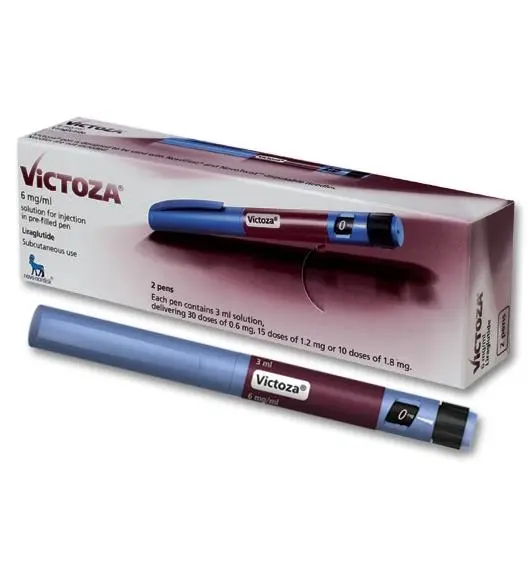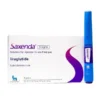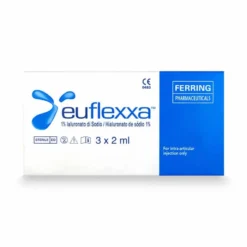What is Victoza?
Victoza is a medicine approved to treat patients with type 2 diabetes, but there are clinical studies that demonstrate its effectiveness for weight loss. Victoza contains the active substance liraglutide and comes in pre-filled pen injectors. Victoza can be administered as a weight loss aid when you have a BMI of 28 or higher. The active substance, liraglutide, slows down the passage of food through the stomach. The feeling of satiety manifests earlier and lasts longer, so you eat less. When combined with proper physical exercise, it helps you lose weight faster.
Warnings
The Saxenda brand of liraglutide is used together with diet and exercise to help people lose weight when they have certain health conditions. Saxenda is not for treating type 1 or type 2 diabetes. Do not use Saxenda and Victoza together.
You should not use Victoza if you have multiple endocrine neoplasia type 2 (tumors in your glands), a personal or family history of medullary thyroid cancer, insulin-dependent diabetes, or diabetic ketoacidosis.
In animal studies, liraglutide caused thyroid tumors or thyroid cancer. It is not known whether these effects would occur in people using regular doses.
Call your doctor at once if you have signs of a thyroid tumor, such as swelling or a lump in your neck, trouble swallowing, a hoarse voice, or shortness of breath.
Before using Victoza
You should not use Victoza if you are allergic to liraglutide, or if you have:
multiple endocrine neoplasia type 2 (tumors in your glands);
a personal or family history of medullary thyroid carcinoma (a type of thyroid cancer); or
diabetic ketoacidosis (call your doctor for treatment).
To make sure Victoza is safe for you, tell your doctor if you have:
stomach problems causing slow digestion;
kidney or liver disease;
high triglycerides (a type of fat in the blood);
heart problems;
a history of problems with your pancreas or gallbladder; or
a history of depression or suicidal thoughts.
In animal studies, Victoza caused thyroid tumors or thyroid cancer. It is not known whether these effects would occur in people using regular doses. Ask your doctor about your risk.
Follow your doctor’s instructions about using Victoza if you are pregnant or you become pregnant. Controlling diabetes is very important during pregnancy, and having high blood sugar may cause complications in both the mother and the baby.
It may not be safe to breastfeed while using liraglutide. Ask your doctor about any risk.
Victoza is not approved for use by anyone younger than 18 years old.
Victoza pregnancy and breastfeeding warnings (more detail)
How should I use Victoza?
Victoza is usually given once per day. Follow all directions on your prescription label. Your doctor may occasionally change your dose. Do not use this medicine in larger or smaller amounts or for longer than recommended.
Do not use Saxenda and Victoza together. These two brands contain the same active ingredient but they should not be used together.
Read all patient information, medication guides, and instruction sheets provided to you. Ask your doctor or pharmacist if you have any questions.
Victoza is injected under the skin at any time of the day, with or without a meal. You will be shown how to use injections at home. Do not self-inject this medicine if you do not understand how to give the injection and properly dispose of used needles and syringes.
Victoza comes in a prefilled injection pen. Ask your pharmacist which type of needles are best to use with your pen.
Your care provider will show you the best places on your body to inject Victoza. Use a different place each time you give an injection. Do not inject into the same place two times in a row.
Do not use Victoza if it has changed colors or looks cloudy, or if it has particles in it. Call your pharmacist for new medicine.
Low blood sugar (hypoglycemia) can happen to anyone who has diabetes. Symptoms include headache, hunger, sweating, irritability, dizziness, nausea, fast heart rate, and feeling anxious or shaky. To quickly treat low blood sugar, always keep a fast-acting source of sugar with you such as fruit juice, hard candy, crackers, raisins, or non-diet soda.
Your doctor can prescribe a glucagon emergency injection kit (GlucaGen) to use in case you have severe hypoglycemia and cannot eat or drink. Be sure your family and close friends know how to give you this injection in an emergency.
Also watch for signs of high blood sugar (hyperglycemia) such as increased thirst or urination, blurred vision, headache, and tiredness.
Blood sugar levels can be affected by stress, illness, surgery, exercise, alcohol use, or skipping meals. Ask your doctor before changing your dose or medication schedule.
Use a disposable needle only once. Follow any state or local laws about throwing away used needles and syringes. Use a puncture-proof “sharps” disposal container (ask your pharmacist where to get one and how to throw it away). Keep this container out of the reach of children and pets.
Victoza is only part of a complete treatment program that may also include diet, exercise, weight control, regular blood sugar testing, and special medical care. Follow your doctor’s instructions very closely.
Storing unopened injection pens: Store in the refrigerator. Do not freeze Victoza, and throw away the medication if it has become frozen. Do not use an unopened injection pen if the expiration date on the label has passed.
Storing after your first use: You may keep “in-use” injection pens in the refrigerator or at room temperature. Protect the pens from moisture, heat, and sunlight. Use within 30 days. Remove the needle before storing an injection pen, and keep the cap on the pen when not in use.
Usual Adult Dose of Victoza for Diabetes Type 2:
Initial dose: 0.6 mg subcutaneously once a day for 1 week; this dose is intended to reduce gastrointestinal symptoms and is not an effective dose for glycemic control.
Maintenance dose: Inject 1.2 mg subcutaneously once a day; if acceptable glycemic control is not achieved, may increase to 1.8 mg subcutaneously once a day
Maximum dose: 1.8 mg once a day
Comments:
-Consider dose reduction of the insulin secretagogue to reduce the risk of hypoglycemia.
-This drug is not recommended as a first-line therapy for patients with inadequate glycemic control on diet and exercise.
| Quantity | Quantity |
|---|
Be the first to review “Victoza -6 Pens” Cancel reply
You must be logged in to post a review.
Related products
Weight Loss
Weight Loss
Weight Loss
Weight Loss
Weight Loss
Weight Loss
Weight Loss












Reviews
There are no reviews yet.